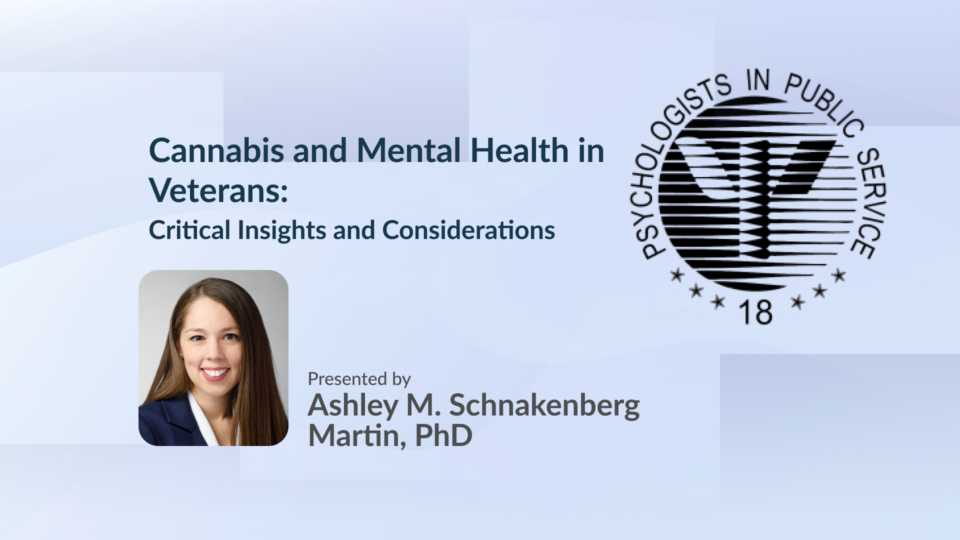Cannabis and Mental Health in Veterans:

Cannabis and Mental Health in Veterans:
Critical Insights and Considerations
- Member Fee
- $0
- Non-Member Fee
- $25

- Member Fee
- $0
- Non-Member Fee
- $25
Presented By
-
 Ashley M. Schnakenberg Martin, PhDMore Info
Ashley M. Schnakenberg Martin, PhDMore Info
Brought to You By
Dates and Times
-
-Live Webinar
Location
-
Live WebinarAccess virtually on TPN.health
The purpose of this live, evidence-based training is to provide current evidence on the effects of cannabis and to discuss how cannabis may impact mental health. The training will help providers better understand the status of the scientific literature around cannabis. Participants will learn about rates and prevalence of use in Veterans and reported rationale for use. The training will give specific attention to the relationship between cannabis use and serious mental illness, such as schizophrenia, given the high rates of cannabis use in psychosis.
- • Counselors
- • Substance Use Disorder Professionals
- • Social Workers
- • Licensed Marriage and Family Therapists
- • Psychologists
The educational goal of this workshop is to increase knowledge about cannabis use and its relationship with mental health, such as anxiety, depression, and psychosis.
At the end of this course, participants will be able to:
-
Discuss current scientific literature about the effects of cannabis use.
-
Identify 3 or more effects of cannabis intoxication.
-
Identify 2 or more effects of cannabis withdrawal and hazards related to cannabis use.
-
Describe the relationship between cannabis and mental health, including anxiety, depression and serious mental illness.
-
Schnakenberg Martin, A. M., D’Souza, D. C., Newman, S. D., Hetrick, W. P., & O’Donnell, B. F. (2021). Differential cognitive performance in females and males with regular cannabis use. Journal of the International Neuropsychological Society, 27(6), 570-580.
-
Schnakenberg Martin, A. M., Bonfils, K. A., Davis, B. J., Smith, E. A., Schuder, K., & Lysaker, P. H. (2016). Compared to high and low cannabis use, moderate use is associated with fewer cognitive deficits in psychosis. Schizophrenia Research: Cognition, 6, 15-21.
-
Schnakenberg Martin, A. M., Ranganathan, M., & D’Souza, D. C. (2023). Cannabis Causes Positive, Negative, and Cognitive Symptoms and Produces Impairments in Electrophysiological Indices of Information Processing. Marijuana and Madness, 156.
TPN.health has been approved by NBCC as an Approved Continuing Education Provider, ACEP No. 7267. Programs that do not qualify for NBCC credit are clearly identified. TPN.health is solely responsible for all aspects of the programs.
Course meets the qualifications for hours of continuing education credit for LPCCs as required by the California Board of Behavioral Sciences. TPN.health is approved by the California Association of Marriage and Family Therapists to sponsor continuing education for LPCCs. TPN.health maintains responsibility for this program/course and its content.
Trusted Provider Network, LLC is recognized by the New York State Education Department’s State Board for Mental Health Practitioners as an approved provider of continuing education for licensed mental health counselors. #MHC-0220.
This course has been approved by TPN.health, as a NAADAC Approved Education Provider, for educational credits. NAADAC Provider #198061, TPN.health is responsible for all aspects of the programming. Counselor Skill Group: Legal, Ethical and Professional Development.
TPN.health, #1766, is approved to offer social work continuing education by the Association of Social Work Boards (ASWB) Approved Continuing Education (ACE) program. Organizations, not individual courses, are approved as ACE providers. State and provincial regulatory boards have the final authority to determine whether an individual course may be accepted for continuing education credit. TPN.health maintains responsibility for this course. ACE provider approval period: 03/31/2022 – 03/31/2025. Social workers completing this course receive 1.25 continuing education credits.
Course meets the qualifications for hours of continuing education credit for LCSWs as required by the California Board of Behavioral Sciences. TPN.health is approved by the California Association of Marriage and Family Therapists to sponsor continuing education for LCSWs. TPN.health maintains responsibility for this program/course and its content.
Trusted Provider Network, LLC is recognized by the New York State Education Department’s State Board for Social Work as an approved provider of continuing education for licensed social workers #SW-0654.
Course meets the qualifications for hours of continuing education credit for LCSWs as required by the California Board of Behavioral Sciences. TPN.health is approved by the California Association of Marriage and Family Therapists to sponsor continuing education for LMFTs. TPN.health maintains responsibility for this program/course and its content.
Trusted Provider Network, LLC is recognized by the New York State Education Department’s State Board for Mental Health Practitioners as an approved provider of continuing education for licensed marriage and family therapists #MFT-0097.
TPN.health is approved by the American Psychological Association to sponsor continuing education for psychologists. TPN.health maintains responsibility for this program and its content.
-
Waiting Room Opens
-
Workshop Begins
-
Workshop Ends

